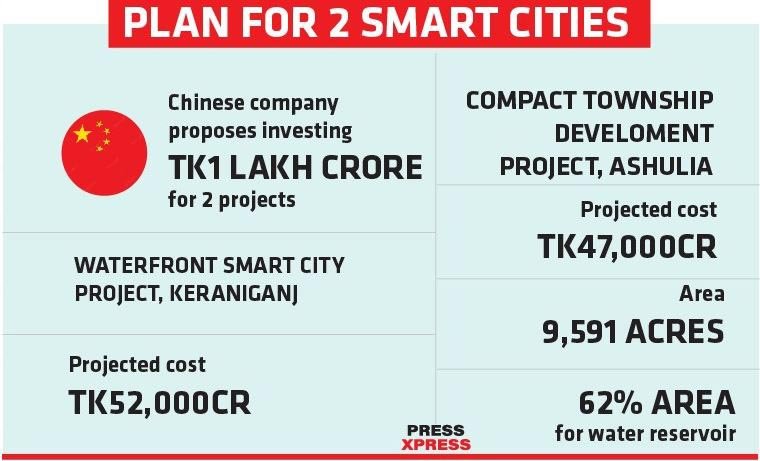Approximately Tk52,000 crore has been allocated for the development of the Waterfront Smart City Project in Keraniganj, situated alongside the Dhaka-Mawa expressway. Moreover, an allocation of Tk47,000 crore has been recommended to support both the Conservation of the Flood Flow Zone of the Turag River and the Compact Township Development Project in Ashulia.
The bilateral economic relationship between Bangladesh and China has flourished, with China occupying a prominent position as a pivotal trading partner and a significant source of Foreign Direct Investment (FDI). Over the preceding decade, China’s FDI inflow into Bangladesh has exceeded $2.6 billion.
When Chinese President Xi Jinping visited Bangladesh in 2016, an MoU was established encompassing 27 projects with an estimated total worth of $20 billion. For nine of these projects, valued at $8.08 billion, loan agreements were endorsed, and just $4.47 billion had been dispensed by June 30, 2023.
You can also read: China’s Economic Ascension and Its Global Impact – An In-depth Analysis
Even though funds are being disbursed slowly in ongoing projects funded by China within the country, a different Chinese company has put forth a substantial investment proposal of around Tk1 Lakh Crore or about $9 billion for two major undertakings.
CRBC, an engineering and construction firm headquartered in Beijing, has presented an extensive investment plan aiming to establish two revolutionary smart cities in Keraniganj and Ashulia.
Details of the Projects
Positioned next to Rajuk’s Jhilmil Project along the Dhaka-Mawa expressway, the Waterfront Smart City project in Keraniganj is planned to encompass a substantial area of about 5,019 acres.
In contrast, the second project encompassing the Compact Township Development in Ashulia and the Conservation of Flood Flow Zone of Turag River holds a strategic stance in the Turag River’s catchment area, covering an extensive 9,519-acre land tract.
With its primary goal being the protection of the flood flow region, the Turag project envisions dedicating a significant 62% of its expanse to the preservation of water bodies.
Out of the remaining 38% land area, Rajuk has plans to develop a compact township, where 8% will be set aside as green space.
The remaining 30% will be utilized for the construction of both residential and commercial buildings, as well as the incorporation of additional recreational facilities.
These projects will undergo four phases of implementation.
Budget:
Projected at Tk52,000 crore, the overall expenditure for the 15-year Keraniganj project includes Tk7,000 crore for land acquisition and Tk17,000 crore for the subsequent land development phase. The proposed smart city will feature small apartments designed to accommodate low-income individuals.
An estimated cost of Tk47,000 crore is foreseen for the execution of the Turag projects.

On May 25, 2022, at the Ganabhaban, a presentation regarding two potential projects was given to Prime Minister Sheikh Hasina by the Ministry of Housing and Public Works along with Rajuk. The Prime Minister highlighted the necessity of executing the projects while giving proper attention to environmental matters.
The Department of Environment gave its approval after a presentation was delivered based on the Environmental Impact Assessment Report on July 10, 2023.
How Chinese Investments are Reshaping Bangladesh’s Economy?
Chinese enterprises have allocated investments across a variety of energy outlets, encompassing coal, solar, and wind facilities, thereby establishing a well-rounded and varied energy portfolio for Bangladesh.
Sewage treatment plants established by Chinese firms in locations like Dhaka have played a role in elevating water quality, diminishing pollution, and advancing the overall living situations of the local inhabitants.
Within the transportation industry, a significant feat has been accomplished through the establishment of 12 highways covering a distance of 550 kilometers, the erection of 21 bridges, and the development of seven railway lines extending a total of 541.9 kilometers.
Approximately 1,000 Chinese companies operating in Bangladesh have resulted in the creation of roughly 550,000 job opportunities. These enterprises have specifically generated employment for around 129,000 individuals within the Export Processing Zones (EPZs).
All in all, the prevailing pattern indicates that Bangladesh has been actively engaging in careful economic relations with China through the BRI. If this course remains unaltered, the BRI holds the capacity to establish a situation where both parties benefit, fostering a concrete bilateral partnership with China. The Twin Smart City project is another strong example.


